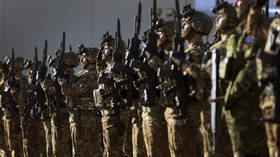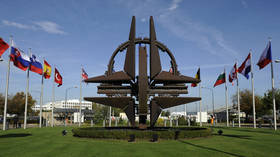NATO to quadruple presence in Eastern European state

NATO plans to send thousands of extra troops to Bulgaria, Prime Minister Nikolai Denkov reportedly announced on Tuesday. The move would expand the battalion-size task force currently stationed in the Balkans country to a reinforced brigade.
The US-led military bloc will increase its troop presence in Bulgaria four-fold, with a “powerful brigade” made up of well-trained units from multiple NATO countries, Denkov was quoted as saying by the Serbian newspaper Politika.
“The plan is for the multinational battle group on our territory to be reinforced up to brigade level,” said Defense Minister Todor Tagarev. He added that Bulgaria will endeavor to have the brigade at full strength, meaning at around 5,000 troops, and that the government in Sofia needs to build the logistics and infrastructure to make that possible.
The battalion-sized task force currently in Bulgaria is made up of troops from several NATO member states. Around 700 are from Italy, which has operational command of the unit. The UK sent a company from the Royal Irish Regiment, while Greece has deployed an anti-tank platoon. Soldiers from Türkiye, North Macedonia, Montenegro and Albania are also part of the force, outfitted with US-made Stryker armored vehicles.
Upgrading this force is part of NATO’s plan for a massive military build-up in eastern Europe, announced last week at the summit in Vilnius, Lithuania. The US-led bloc plans to dramatically expand its 40,000-strong Response Force (NRF) to over 300,000 troops, citing the supposed danger from Russia and the Ukraine conflict.
The battalion in Bulgaria was actually announced in late 2021, prior to the escalation of hostilities in Ukraine, as part of the NATO build-up in Romania, Bulgaria, Hungary and Slovakia to match the increased presence in Poland and the Baltic states.
The parliament in Sofia approved its creation in late January 2022, though it was initially supposed to be a Bulgarian formation – but NATO made it an Italian-led project the following month. France was given the lead in neighboring Romania. All battle groups are ultimately under the authority of the Supreme Allied Commander Europe (SACEUR), currently US Army General Christopher Cavoli.
Bulgaria joined NATO in 2004, as part of the bloc’s march eastward that Moscow has repeatedly condemned as a security threat and a breach of promises made at the end of the Cold War. Last week, Sofia announced it would send 100 armored vehicles to Ukraine, while hoping to get replacements from the US. Denkov’s cabinet made the decision against the recommendations of President Rumen Radev, who has favored negotiations over supplying Kiev with weapons.














